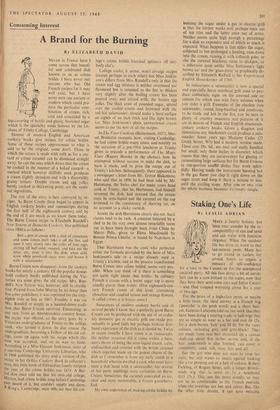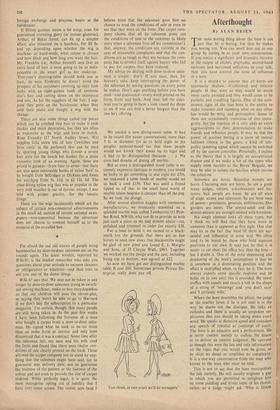Staking One's Life
By LESLIE ADRIAN
MANY a family holiday has been' rent asunder by the in- compatibility of sun and sand and salt water with feminine elegance. When the outdoor life has done its worst to that last-minute perm. Mum has to go round in curlers for several hours to regain a
• . • measure of self-confidence for a visit to the Casino, or for the unexpected cocktail party. All this fuss about a bit of untidy hair can be a sore irritant to the males, now that they have their semi-crew cuts and Julius Caesars --and Dad stopped worrying about his a year or two ago.
For the price of a. high-class perm, or maybe a little more, the ideal answer is a 'French wig ('postiche' is the -posh word) and a short hair- cut. Galeries Lafayette told me last week that they have been doing a roaring trade in half-wigs that are as simple to wear as a hat and cost £6 I 5s. for a dark-brown 'bob' and 18 8s, for the rarer colours, including grey and grey-black! They are made from real hair mounted on a canvas skull-cap about five inches across and, if the hair underneath is also bobbed, can cover it completely, sand, salt, stray bits and all.
For the girl who does not want to crop her curls, but still wants to insure against looking like a rat peeping out of a ball of oakum, Robert Fielding. of Regent Street, sells a longer British- made wig that is sewn on to a . headband (f 15 15s.). This one, fits more closely, so may not be as comfortable as the French postiche when the evenings are hot and sultry. •But, like the other little deceits, it can save valuable foreign exchange and precious hours at the hairdresser.
If fifteen guineas seems a bit steep, even for guaranteed crowning glory (or instant glamour), Arthur, of Baker Street, can fix up a simpler affair, also mounted on a bandeau, for £8 8s. and up, depending upon whether the wig, is machine- or hand-made, what colour is chosen and how thick and how long you want the hair. Mr. Franklin (i.e., Arthur himself) says that an extra head of hair is soon going to be as indis- pensable to the smart girl as her make-up: 'Everyone's dressing-table should hold one at least,' he says. Evidently he doesn't mind the prospect of his customers covering up their lank locks with an eight-guinea hank of someone else's hair and cutting down on the shampoos and sets. As for the suppliers of the hair, I sup- pose they gave up the hairdresser when they sold their plaits and bought a wig with the change.
There are also some things called top pieces which can be combed into hair to make it look thicker and more decorative, but they are often as expensive as the wigs and have to match. Rose Evansky (17 North Audley Street, WI) supplies little extra bits of hair ('switches and false curls' in the parlance) that can be used by sporting young things who favour a severe hair style for the beach but hanker for a more romantic look of an evening. Again, these are priced in guineas—from four to seven—but there are also quite reasonable hanks of nylon 'hair' to be bought from Selfridges or Dickens and Jones for anything from 5s. 11d. to £2 12s. 6d. The close-fitting nylon wig that was so popular in the very cold weather is out of favour, except, I was told with proper gravity, 'for the lunatic fringe.'
These are the wigs incidentally which are the subject of certain non-committal advertisements in the small ad. section of certain national news- papers—non-committal because the advertiser does not choose to commit himself as to the material of the so-called hair.
I'm afraid the sad old stories of people being bamboozled by door-to-door salesmen are on the rounds again. The latest wrinkle, reported by Which?, is the market researcher who asks you questions about your attitude to vacuum cleaners or refrigerators or whatever—and then tries to sell you one of the damn things.
Which? says that 'We may not be taken in any longer by door-to-door salesmen trying to switch- sell sewing machines, make us buy encyclopedias so that our children will pass the eleven-plus, or saying they won't be able to go to Harvard if we don't buy the subscription to a particular magazine.' I'm certain, though, that many people are still being taken in. In the past few weeks I have been following the fortunes of a man who bought a carpet from a door-to-door sales- man. He signed what he took to be no more than an order form or invoice and only later discovered that it was a contract. Some time after the salesman left, my man and his wife read the form and found that there were twelve con- ditions of sale clearly printed on the back. These allowed the carpet company not to stand by any- thing that the salesman might have said, not to guarantee any delivery date, not to guarantee the trueness of the pattern or the fastness of the colour and not even to provide the size of carpet ordered. While perfectly legal, it is quite the most outrageous opting out of liability that I have ever come across. The victim says (and I believe him) that the salesman gave him no chance to read the conditions of sale or even to see that they were on the form. The' carpet com- pany claims that all its salesmen point out the conditions of sale to the customer (a likely story when a salesman lives off his commission!), that, anyway, the conditions are variable in the case of reasonable complaints and that the con- ditions are as tough as they are because the com- pany has to protect itself against buyers who fail to pay for carpets they have ordered.
My advice on dealing with door-to-door sales- men is simple: don't. If you must, then, for heaven's sake, keep interrupting the patter of the salesman by asking questions on every point he makes. Don't sign anything before you have read—and questioned—every word printed on the form, front and back. And then, tell the sales- man you're going to have a look round the shops to see if you can find a better bargain than the one he's offering.
We needed a new dining-room table. It had to be round (for easier conversation), more than 5 ft. in diameter (so as to hold eight to ten people), pedestal-based (so that these people would not knock their knees on its legs) and it had to be distinguished (because . . .). We even had dreams of dining off marble.
But as even a distinguished wood table is ex- tremely expensive (antique or modern, you would be lucky to get something to seat eight for £70), we reckoned a table made of marble would set us back a cool £150. That was until a friend tipped us off that in the small hard world of marble tables bespoke is cheaper than off the peg. So we took the plunge.
After several abortive haggles with tombstone manufacturers, we eventually stumbled on a splendid marble man called Tamburrini (11 Pem- ber Road, NW10), who saw fit to provide us with just such a piece as we had dreamt about—cut, polished and trimmed to order for exactly £38.
For a base to hold it we turned to a black- smith (on the grounds that there are so few horses to need new shoes that blacksmiths might be glad of new jobs) and found E. J. Margrie and Sons, of 33 Cheyne Walk, SW3. Together we worked out the design and the cost, including fixing top to bottom, was agreed at £22.
So now we have got our distinguished marble table. It cost £60. Sometimes private Private En- terprise really does pay off.
'Just think, in two years we'll 'be teenagers.'































 Previous page
Previous page